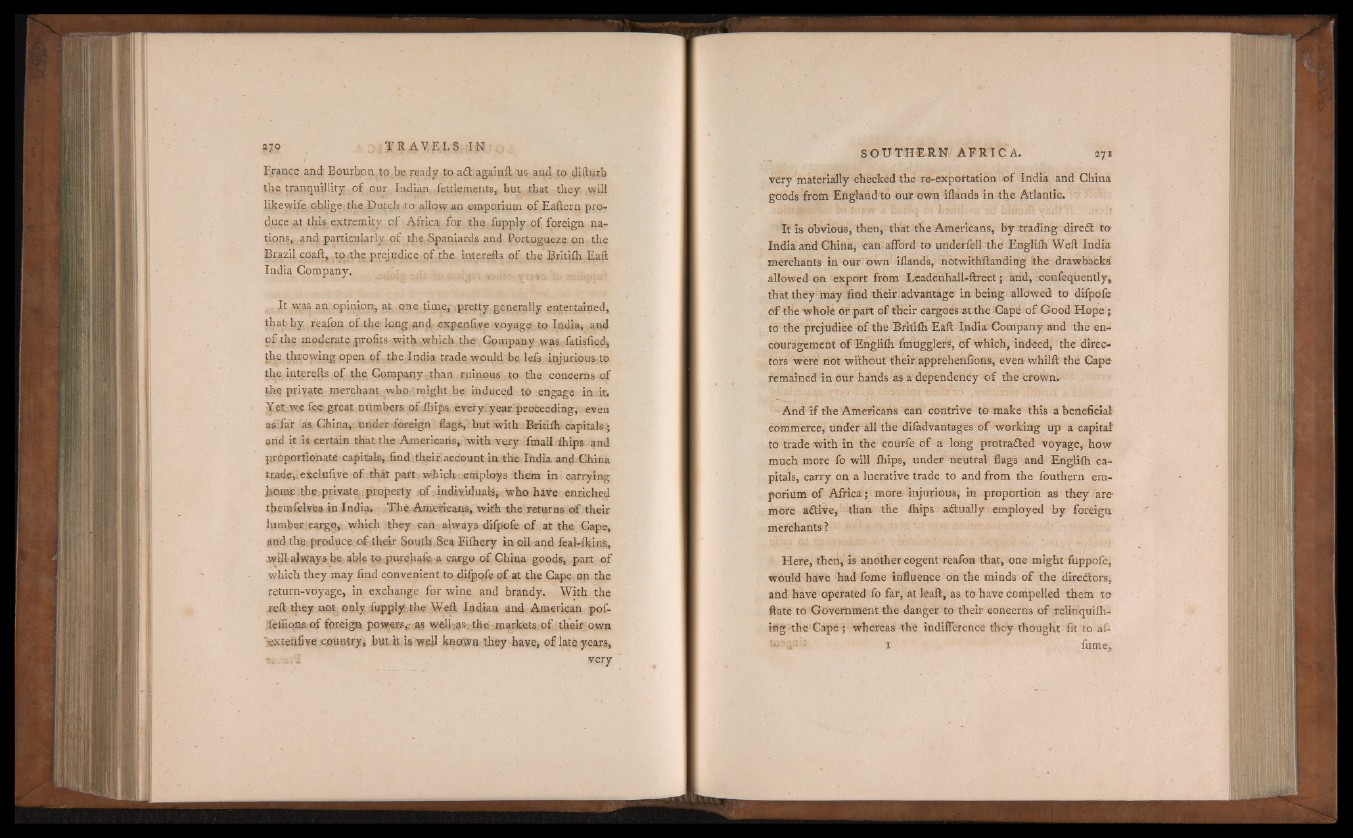
France and Bourbpn.to.be ready to a£t againft us and to diftutb
the tranquillity of our Indian fettlements, but that they will
likewife oblige the Putch .to allow an emporium of Eaftern produce
at this extremity of Africa, for the fupply of foreign nations,
and particularly of the Spaniards and Portugueze on the
Brazil coait, to the prejudice of the interefts of the Britiih Eaft
India Company.
It was an opinion, at one time, .pretty generally entertained,
that by reafon of the long antf expenfive voyage, to India, and
of the moderate profits with which the Company was fatisfied*,
{fie throwing open of the India trade would be lefs injurious to
the interefts of the Company, than ruinous to the concerns of
the private merchant who might be induced to engage in it.
Xe.t.we fee great numbers of Blips every, year'proceeding, even
as.far as China,, under foreign flags, but with Britiih capitals ;
and it is certain that the Americans, with very Tmall fhips and
proportionate capitals, find their account in the India and China
trade^exclufive of that part. which employs them in carrying
home the private property of individuals, who have enriched
themfelves in Indian The Americans, with the returns of their
lumber eargo, which they can always difpofe of at the'Gape,
and the produce of their South Sea Fiihery in oil and feal-ikins,
.willalways he able to purchafc a cargo of China goods, part of
which they may find convenient to. difpofe of at the Cape on the
return-voyage, in exchange for wine and brandy. With the
reft they not only fupply the Weft Indian and American pof-
;feifiQas of foreign powers,; as we.lhas. the markets of their own
'extenfive country, but it is well known they have, of late years,
very
very materially checked the re-exportation of India and China
goods from England to our own iflands in the Atlantic.
It Is obvious, then, that the Americans, by trading diredt to
India and China, can afford to underfell the Engliih Weft India
merchants in our own iflands, notwithftanding the drawbacks
allowed on export from Leadenhall-ftreet ; and, confequently,
that they may find their, advantage in being allowed to difpofe
of the whole or part of their cargoes at the Cape of Good Hope ;
to the prejudice of the Britiih Eaft India Company and the encouragement
of Engliih ftnugglers, of which, indeed, the directors
were not without their apprehenfions, even whilft the Cape
remained in our hands as a dependency of the.crown.
And if the Americans ean contrive to make this a beneficial
commerce, under all the difadvantages of working up a capital
to trade with in the courfe of a long protrailed voyage, how
much more fo will Ihips, under neutral flags and Engliih capitals,
carry on a lucrative trade to and from the fouthern emporium
of Africa ; more injurious, in proportion as they are
more aâive, than the ihips aitually employed by foreign
merchants ?
Here, then, is another cogent reafon that, one might füppoiè,
would have had fome influence on the minds of the direitors,
and have operated fo far, at leaft, as to have compelled them to
ftate to Government the danger to their eoneerns of relinquiih-
ing-the Cape 3 •'whereas the indifference they thought fit to af-
fnegmî 1 fume,